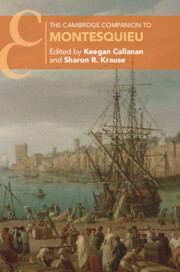Book contents
- The Cambridge Companion to Montesquieu
- Other Volumes in the Series of Cambridge Companions
- The Cambridge Companion to Montesquieu
- Copyright page
- Contents
- Contributors
- Acknowledgments
- Chronology
- Abbreviations
- 1 Montesquieu
- 2 Persian Letters
- 3 Considerations on the Romans
- 4 The Spirit of the Laws
- 5 Montesquieu and the Classical World
- 6 Montesquieu’s Guiding Principles and Foundations
- 7 Montesquieu on Virtue
- 8 Internationalism, Cosmopolitanism, and Empires
- 9 Liberty in Montesquieu
- 10 Political Sovereignty in Montesquieu
- 11 Montesquieu on Slavery
- 12 Montesquieu and the Liberty of Women
- 13 Political Economy
- 14 Religion and Politics
- 15 Constitutional History
- 16 Montesquieu and the Enlightenment
- 17 Montesquieu’s Liberal Legacies
- Bibliography
- Index
- Other Volumes in the Series of Cambridge Companions
17 - Montesquieu’s Liberal Legacies
Published online by Cambridge University Press: 23 February 2023
- The Cambridge Companion to Montesquieu
- Other Volumes in the Series of Cambridge Companions
- The Cambridge Companion to Montesquieu
- Copyright page
- Contents
- Contributors
- Acknowledgments
- Chronology
- Abbreviations
- 1 Montesquieu
- 2 Persian Letters
- 3 Considerations on the Romans
- 4 The Spirit of the Laws
- 5 Montesquieu and the Classical World
- 6 Montesquieu’s Guiding Principles and Foundations
- 7 Montesquieu on Virtue
- 8 Internationalism, Cosmopolitanism, and Empires
- 9 Liberty in Montesquieu
- 10 Political Sovereignty in Montesquieu
- 11 Montesquieu on Slavery
- 12 Montesquieu and the Liberty of Women
- 13 Political Economy
- 14 Religion and Politics
- 15 Constitutional History
- 16 Montesquieu and the Enlightenment
- 17 Montesquieu’s Liberal Legacies
- Bibliography
- Index
- Other Volumes in the Series of Cambridge Companions
Summary
This chapter explores the particularity of Montesquieu’s political vision that includes a commitment to traditional social orders alongside a defence of liberty. It demonstrates how later theorists associated with the liberal tradition develop at least one of three features largely derived from Montesquieu’s work that we now associate with modern liberalism once combined with a commitment to social and political equality. These features are: institutional and constitutional organization to guarantee political accountability and the rule of law; social pluralism and representative government as a structure for the aggregation, education and voicing of broad social interests; and an ethos of moderation and avoidance of cruelty in social and political life. They characterize broad aspects of the liberal tradition at the level of institutional design, the structure of civil society and the broad social ethos needed to sustain it. The chapter concludes with reflections on perceived threats to liberalism today.
Keywords
- Type
- Chapter
- Information
- The Cambridge Companion to Montesquieu , pp. 289 - 306Publisher: Cambridge University PressPrint publication year: 2023

